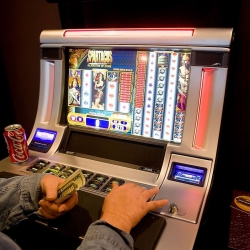
VGTs proponents say their gaming machines help local small business owners, while opponents says VGTs hurt companies that create more jobs.
Illinois video gambling terminals (VGTs) have generated more revenues this year than the state’s 10 riverboat casinos, making it the first time VGTs have outraised the traditional casino niche. According to the Illinois Commission on Government Forecasting and Accountability, VGTs generated $297 million in revenues, while riverboat casinos collected $270 million.
The release of the government statistics has restarted the VGT debate in Illinois. Since video gambling terminals were legalized in 2012, the slots-style gaming machines have been controversial among community leaders and state-level politicians.
In recent months, the city council of Champaign extended a moratorium on VGT licenses. Champaign’s decision was just the latest in a series of local battles across the State of Illinois over the controversial gaming machines. In fact, Illinois’s VGT industry is being debated in Pennsylvania lawmakers’ deliberations over passing expanded gambling. The news that VGTs collected more tax revenues than riverboat casinos garnered the most attention back in Illinois, though.
Tom Swoik: Market Is Saturated
Tom Swoik, executive director of the Illinois Casino Gaming Association, said the statistics are not good news. Mr. Swoik told the Daily Herald, “The market is oversaturated and revenues are just shifting from one spot to another.”
Illinois gambling laws allow bars or restaurants which serve alcohol to host up to 5 video gambling terminals. The establishment pays a meager $100 annual fee, then keeps 35% of the revenues. Machine operators pay a $5000-a-machine annual fee, while also keeping 35%.
Illinois VGT Revenue Sharing
The State of Illinois receives 25% of the revenues, while the local municipality keeps the remaining 5%. The VGT measure was designed to increase state revenues, while giving small business owners across the state a much-needed boost in revenues. It has, at least in communities which adopted local VGT laws.
Under the VGT legislation, cities and towns are given the ability to pass VGTs or ban them. Many city leaders have taken a stand against VGTs, because they do not want to encourage gambling or because they hope to avoid the social problems associated with problem gambling. The City of Chicago, for instance, placed a total ban on video gambling terminals.
Video Gambling Terminals in Local Communities
Those leaders face tough decisions. When nearby communities approve VGTs, those leaders see residents drive to the next town over to gamble. Money leaves the community and swells the coffers of nearby municipalities. Meanwhile, local business owners see their competitors a few miles down the road get richer, while they fall behind. Inevitably, they push for VGTs in their community.
The Illinois riverboat casinos doubtless have been hurt by the VGT legislation. The casinos complain that the state does not receive that much more revenues, because the VGT establishments simply cannibalize their business. That is not entirely true, as Illinois is on the verge of collecting the most tax revenues from gambling in 10 years. The casino lobby would argue that the Illinois Lottery accounts for most of the growth, while their own revenues have declined significantly.
Pennsylvania VGT Legislation
Pennsylvania state lawmakers have considered VGT legislation, as they try to make up a $2.2 billion budget deficit. The Pennsylvania House of Representatives passed a VGT bill earlier this year, but the Pennsylvania Senate declined to pass that bill. The 12 land-based casinos lobbied hard to keep VGTs out of the state, and even cited the Illinois VGT statistics to make their case.
Pennsylvania House Republicans push video gambling terminals. One lawmaker claimed that legalized VGT legislation would undermine the illegal VGT industry. A House chairman decided to hold a September committee hearing on VGTs, essentially daring his House colleagues to prove their claims.
Opposition to VGTs
Despite support from the Pennsylvania Tavern Association, the VGT bill is unlikely to happen. Unlike Illinois, Las Vegas Sands Corp owns a casino in Pennsylvania: the Bethlehem Sands Resort and Casino. As the richest casino company in the world, LVS had the resources to pour $1 million into Pennsylvanians For Responsible Government — a political action committee dedicated to undermining the VGT legislation.
Using an ad campaign that suggested the VGTs would make Pennsylvania “The Land of 12,000 Casinos”, Pennsylvanians For Responsible Government suggested that the bill would put gaming machines in laundrymats and nursing homes. Such hyperbole might not be factual, but it worked to scare lawmakers off the original VGT bill.
